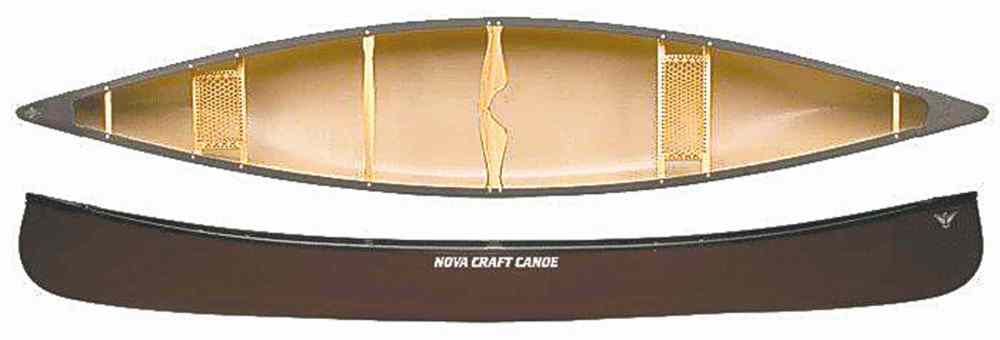Get your Royalex while you can
Popular material for canoes is no longer being produced
Advertisement
Read this article for free:
or
Already have an account? Log in here »
To continue reading, please subscribe:
Monthly Digital Subscription
$0 for the first 4 weeks*
- Enjoy unlimited reading on winnipegfreepress.com
- Read the E-Edition, our digital replica newspaper
- Access News Break, our award-winning app
- Play interactive puzzles
*No charge for 4 weeks then price increases to the regular rate of $19.00 plus GST every four weeks. Offer available to new and qualified returning subscribers only. Cancel any time.
Monthly Digital Subscription
$4.75/week*
- Enjoy unlimited reading on winnipegfreepress.com
- Read the E-Edition, our digital replica newspaper
- Access News Break, our award-winning app
- Play interactive puzzles
*Billed as $19 plus GST every four weeks. Cancel any time.
To continue reading, please subscribe:
Add Free Press access to your Brandon Sun subscription for only an additional
$1 for the first 4 weeks*
*Your next subscription payment will increase by $1.00 and you will be charged $16.99 plus GST for four weeks. After four weeks, your payment will increase to $23.99 plus GST every four weeks.
Read unlimited articles for free today:
or
Already have an account? Log in here »
Hey there, time traveller!
This article was published 21/06/2014 (4169 days ago), so information in it may no longer be current.
Imagine if peanuts suddenly went extinct and you could never make a jelly sandwich again.
Imagine if the world exhausted its entire supply of lithium and no one could ever manufacture another iPhone or flat-screen TV.
Nowhere near as many people paddle canoes as eat peanut butter or use electronics. But the canoeing world is suffering from a shortage of its own: the disappearance of Royalex, a material used to manufacture boats for decades — and a big reason rocky rivers are even navigable by people who are not expert-level paddlers.

If you’ve paddled a few canoes, you’ve probably been inside a Royalex boat. Invented in the 1970s by Uniroyal — yes, the tire company — the vinyl-plastic composite quickly became the nearly indestructible material of choice for canoes used by summer camps, whitewater paddlers or any user group likely to dish out a lot of abuse on a boat.
Up until the ’70s, aluminum canoes were the toughest boats out there. Boats made by Grumman and Alumacraft were ubiquitous.
The problem was, aluminum canoes were noisy enough to scare off fish and wildlife, grabby on rocks and obnoxious to repair. The seats also had a propensity to tear and present a jagged edge to any paddler who failed to notice they were plunking their butt down on a serrated surface.
Royalex, which is basically a sandwich of vinyl and ABS plastic, proved more useful than aluminum because it was lighter, more buoyant and all but impossible to destroy in a single mishap.
Royalex is amazing at retaining its shape, which is great when you’re bouncing off rocks in a river or getting dropped on a granite landing. There are numerous tales of Royalex boats falling off moving vehicles or getting wrapped around rocks in high-volume rivers and still surviving to paddle another day.
Royalex wasn’t perfect — Kevlar and fibreglass boats proved to be lighter and ordinary plastic was cheaper.
But the mere existence of Royalex boats meant many rivers once deemed too rocky to paddle were suddenly navigable. You no longer had to be a perfect paddler to go tripping in remote places.
Now, the material is all but disappearing from outdoor retailers, though not for a lack of demand.
Last year, an international plastics company called PolyOne purchased a smaller one called Spartech, which happened to own the former Uniroyal plant in Indiana that was the only place in the world where anyone made Royalex.
According to Canoe & Kayak magazine and other outdoor publications, PolyOne was simply too big to bother producing a product that was only used by canoe manufacturers.
Canoeing isn’t a big growth industry. Since the 1980s, it’s faced competition from other water sports such as windsurfing, kayaking, kiteboarding and lately, stand-up paddleboarding.
Faced with little prospects for growth, PolyOne announced last year it would stop making Royalex. Production wrapped up in the winter, shipments of the material ceased this spring and manufacturers are now scrambling to find a replacement.
In Quebec, the Esquif canoe company is developing a similar material it hopes to put into production next year, Canoe & Kayak reported in May. The new stuff is supposed to be lighter than Royalex, but also more expensive.
That means now is the time to buy a new or used Royalex boat, assuming you’ve always had your eye on one, you absolutely need one and you can get your hands on one.
Winnipeg retailers The Wilderness Supply and Mountain Equipment Co-op are both reporting brisk sales of Royalex boats this year, but may have enough supply coming for the next few months.
There is no need to panic and buy a boat; a replacement will come, even if Esquif’s plans are delayed. But if you have a pressing need for a very durable canoe, go see what’s still out there.
As a longtime flatwater paddler who’s still figuring out whitewater, anything less durable would prove disastrous. People with merely passable skills — that is, people like me — are fine paddling dainty fibreglass on lakes, but need something that can handle punishment on rivers.
bartley.kives@freepress.mb.ca


